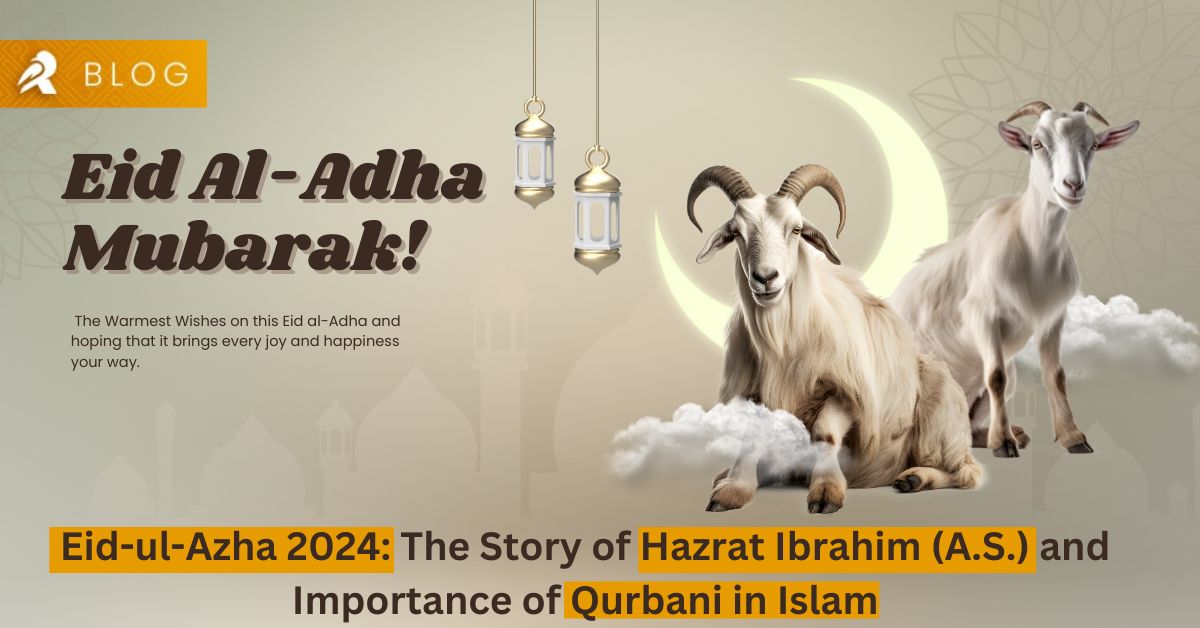Eid-ul-Azha, also known as the “Festival of Sacrifice,” or “Eid-e-Qurban” is one of the most significant religious holidays in Islam. It is celebrated by millions of Muslims worldwide with deep devotion and a spirit of giving. This festival not only commemorates the willingness of Prophet Ibrahim (Abraham) to sacrifice his son in obedience to Allah Almighty but also highlights the virtues of faith, sacrifice, and charity. This article will discuss historical vision, religious significance, and contemporary practices associated with Eid-ul-Azha.
Historical Roots of Eid-ul-Azha
The story of Eid-ul-Azha dates back to the time of Prophet Ibrahim, who is well known in Islamic history for his unwavering faith and obedience to Allah (God). He is titled as ‘Khalilullah’ meaning as ‘Friend of Allah’ due to his selfless love towards Allah Almighty According to Islamic tradition, Allah commanded Ibrahim to sacrifice his beloved son, Ismail (Ishmael), as a test of his faith. Ibrahim was prepared to carry out the command in complete submission order of Allahl. However, just as he was about to perform the sacrifice, Allah intervened and provided a ram to be sacrificed in place of Ismail. Allah loved this act of Hazrat Ibrahim (A.S) so much that he ordered ummat of Hazrat MUHAMMAD (s.a.w) to do ‘Qurbani’ each year on 10th zilhaj of Islamic Year. This act of devotion is celebrated annually by Muslims worldwide during Eid-ul-Azha.
Significance in Islam
Eid-ul-Azha falls on the 10th day of Dhu al-Hijjah, the last month of the Islamic lunar calendar, and marks the end of Hajj, the annual pilgrimage to Mecca. The festival is observed by Muslims regardless of whether they have performed Hajj.
The central theme of Eid-ul-Azha is sacrifice, symbolizing the willingness to give up something valuable for the sake of Allah. This act of sacrifice, known as Qurbani, involves the slaughtering of an animal such as a goat, sheep, cow, or camel. The meat from the sacrificed animal is then distributed among family, friends, and the less fortunate, ensuring that everyone can partake in the joy of the festival.
Spiritual Reflection
Eid-ul-Azha serves as a reminder for Muslims to reflect on their own lives and their relationship with Allah. It encourages believers to:
Strengthen Their Faith: By remembering the story of Prophet Ibrahim, Muslims are reminded of the importance of faith and obedience to God’s commands, even when faced with difficult trials.
Qurbani (Sacrifice): The act of Qurbani teaches Muslims the value of selflessness and the importance of sacrificing personal gains for the greater good.
Practice Charity: Eid-ul-Azha underscores the significance of helping those in need. Distributing meat to the less fortunate reinforces the Islamic principles of compassion, generosity, and social justice.
Which animals are eligible for Qurbani?
The animals commonly used for Qurbani are sheep, cows, goats and camels. They can be male or female but must be in good health and free from any defects. The goats and sheep must be at least one year old, cattle two years and camels five years old.
Each Qurbani animal makes up a certain number of shares. A small animal such as a sheep or goat counts as one Qurbani share, while larger animals like camels and cattle count as seven Qurbani shares each. You can buy as many shares as you like – one for each family member, and even for loved ones who have passed on.
Practices on the Day of Ed-ul-Azha
The celebration of Eid-ul-Azha varies across different cultures and regions, but some common practices include:
Performing Qurbani: Families come together to perform the ritual sacrifice, and the meat is divided into three parts: one-third for the family, one-third for relatives and friends, and one-third for the needy.
Special Prayers: Muslims gather at mosques or open fields for special Eid prayers, known as Salat-al-Eid. These prayers are a means of expressing gratitude to Allah and seeking His blessings.
Gatherings of Friends and Families: The festival is marked by feasts, family gatherings, and communal meals. Traditional dishes and sweets are prepared and shared with loved ones.
Giving to Charity: In addition to distributing the meat, many Muslims also make monetary donations to charitable organizations and provide aid to those in need.
Read more interesting articles on Rabt Blogs.
The Final Words
Eid-ul-Azha is a profound expression of faith, sacrifice, and community in Islam. It brings together Muslims from all walks of life to honor the legacy of Prophet Ibrahim, reflect on their spiritual journey, and engage in acts of charity and kindness. As we celebrate our sacred festival, let us remember the true essence of Eid-ul-Azha and strive to be obedient to our beloved creator, Allah.
Wishing all the muslims, Eid ul-Azha filled with love, peace, and prosperity, from entire team of Rabt Marketing. May the blessings of Allah be with you and your family on this auspicious occasion of Eid ul-Azha.

